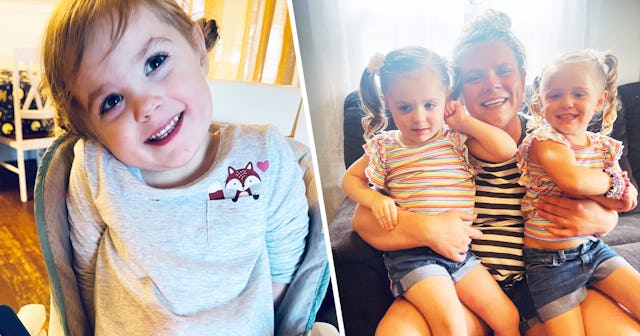I Shouldn't Have To Tell You My Daughter Is Autistic For You To Be A Decent Human
It shouldn’t be so difficult to understand that some kids (and adults) need accommodations.

In the last year, I’ve concluded that people expect autistic individuals to look a certain way. Because even though my daughter displays the disorder’s most “stereotypical” characteristics, folks act stunned when I tell them she has autism.
It all started when I was at the doctor’s office this winter, and my daughter was squealing quite a bit. These noises she tends to make are a happy stim, and they bring me a lot of joy as her mother (they are also fairly typical with autistic children). But, at the same time, I am aware of her volume, and I recognize how it might be unsettling to others in specific settings. So, when we’re in an environment that requires inside voices (such as a doctor’s office), of course, I try to help her express her emotion in other, positive ways. Sometimes, like in this instance, it doesn’t always work that way, though.
My doctor was unfazed by the noise. He noticed my attempts to try to redirect her and casually told me, “Don’t worry about it. She’s not bothering me.” This sort of calm energy is so welcome when you’re a mom with a child whose behavior typically attracts negative attention from others. So, I did as he said — I stopped worrying about it. However, it would seem my nurse was more concerned over her behavior than the doctor was.
Without even taking notice of the giant smile on my daughter’s face and only hearing the noise she was making, she said, “Someone doesn’t sound happy.” She then asked her to use an inside voice. I let that go, but when she used a sticker as a bargaining chip to get my daughter to say please and make eye contact with her, it ended there.
Courtesy of Caila Smith
I told the nurse that my daughter was autistic and the way she was handling the situation was inappropriate. She apologized and handed her the sticker, trying to play good-cop with me until I left. But looking back, it makes me angry that I had to provide my daughter’s diagnosis for her to show an ounce of empathy.
It shouldn’t be so difficult to understand that some kids (and adults) need accommodations. But perhaps what is worse than failure to grasp this concept is the subconscious assumption that every “normal-looking” person is neurotypical. We seem to forget that autism and many other disabilities don’t have a specific “look,” and thinking otherwise is an expression of ableism that only further promotes discrimination onto the autistic community.
My daughter might kick, scream, pinch, or hit herself if she’s having a hard time. Folks might perceive this behavior as “bratty,” when really, she’s unbelievably frustrated that she can’t communicate with me what is wrong. These behaviors are how she self-regulates. Sure, they aren’t ideal coping strategies, but we’re working on it.
And I shouldn’t have to explain any of this for people to be decent human beings.
Courtesy of Caila Smith
Too many folks don’t recognize that behavior is a form of communication, too. And for people who are nonverbal and have autism, the way they respond to situations is how they express what they need, want, or feel.
We can’t deprive a neurotypical child of their words mid-meltdown or tell them to tone down their excitement without stripping them of the skills they need to cope with their emotions — the same is true for an autistic child and their behavior. Parents and caregivers can redirect, distract, or utilize regulation techniques to help support them, but we cannot (and should not) hinder how any child communicates, especially when one’s communication might already be limited.
Courtesy of Caila Smith
So actually, the foul stares, scornful remarks, and childrearing advice aren’t helpful from someone who doesn’t have the slightest clue how to parent an autistic child. And apologizing and excusing this behavior with words like, “Sorry, I didn’t know,” doesn’t work either. Because the thing is, people shouldn’t have to know a child’s diagnosis to mind their own business.
I’ve stopped apologizing and providing excuses for my daughter because it doesn’t benefit her — or me — at all. The only thing it does is appease the folks who are being judgmental, and we don’t owe them a damn thing. It might also make my daughter feel more vulnerable in social settings, and that’s the exact opposite of what I intend to do.
So when she does her happy squeals or paces back and forth while flapping and humming, it fills my heart with joy — it makes me happy because I know that she is happy. And these moments get to be just as beautiful and fulfilling for us, even when they may look different compared to others.
My autistic daughter is doing the best she can, and her best is enough.
Courtesy of Caila Smith
This article was originally published on